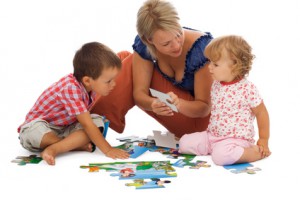What Can Puzzles Teach Us About Self-Critical Children & Their Parents?
What can puzzles teach us about self-critical children and their parents? I must admit…that’s not a question I ever asked myself. However, researchers at the National University of Singapore did and boy am I glad. They followed 263 children for 5 years starting at 7-years-old. In the first year, the children were given puzzles to solve in a limited period of time. Their parents accompanied them and were told they could help if needed. The researchers’ objective was to watch whether the parent became intrusive and, if they did,  how intrusive. An example of highly intrusive parenting would involve a parent taking the puzzle away from the child to reverse a mistake they had made. The researchers wanted to know whether the parent interfered with their child’s problem-solving opportunities or allowed their child to learn from mistakes. This puzzle assessment was repeated when the children were 8-, 9-, and 11-years-old. The researchers also tested the children for levels of self-criticalness and perfectionism. Guess what the research uncovered. You got it. Children who had highly intrusive parents engaged in more self-critical behavior and perfectionism. The children in this study who reported increased levels of self-critical behavior and perfectionism also reported more symptoms of depression and anxiety as the study progressed. Consider the progression suggested by this study. Parents intrude upon their children’s activities by interfering with their children’s independent problem-solving. This conveys an implicit message from parent to child that “you can’t solve your own problems; I have to step in to do it for you.” As a result, children never feel “good enough.” Although they feel inadequate, they also recognize their parents’ desire for perfection. As a result, even the smallest mistake leads the child to criticize themselves for not being “perfect,” for not “meeting standards.” This, in turn, increases the risk for depression and anxiety. I like the quote from the lead researcher: “Our findings indicate that in a society that emphasizes academic excellence…parents may set unrealistically high expectations on their children. As a result, a sizable segment of children may become fearful of making mistakes. Also, because they are supposed to be ‘perfect,’ they can become disinclined to admit failures and inadequacies and seek help when needed, further exacerbating their risk for emotional problems.”
how intrusive. An example of highly intrusive parenting would involve a parent taking the puzzle away from the child to reverse a mistake they had made. The researchers wanted to know whether the parent interfered with their child’s problem-solving opportunities or allowed their child to learn from mistakes. This puzzle assessment was repeated when the children were 8-, 9-, and 11-years-old. The researchers also tested the children for levels of self-criticalness and perfectionism. Guess what the research uncovered. You got it. Children who had highly intrusive parents engaged in more self-critical behavior and perfectionism. The children in this study who reported increased levels of self-critical behavior and perfectionism also reported more symptoms of depression and anxiety as the study progressed. Consider the progression suggested by this study. Parents intrude upon their children’s activities by interfering with their children’s independent problem-solving. This conveys an implicit message from parent to child that “you can’t solve your own problems; I have to step in to do it for you.” As a result, children never feel “good enough.” Although they feel inadequate, they also recognize their parents’ desire for perfection. As a result, even the smallest mistake leads the child to criticize themselves for not being “perfect,” for not “meeting standards.” This, in turn, increases the risk for depression and anxiety. I like the quote from the lead researcher: “Our findings indicate that in a society that emphasizes academic excellence…parents may set unrealistically high expectations on their children. As a result, a sizable segment of children may become fearful of making mistakes. Also, because they are supposed to be ‘perfect,’ they can become disinclined to admit failures and inadequacies and seek help when needed, further exacerbating their risk for emotional problems.”
So, what’s a parent to do? Here are 3 ideas.
- Focus on your children’s efforts rather than the end results. Acknowledge your children’s efforts rather than comparing their results with someone else’s results. Effort produces success over time. So, focus on effort and nurture an excitement to try new things without fear of failure (which brings us to tip number 2).
- Create an environment in which mistakes and temporary failures are opportunities for learning. Ask what your children learned rather than the final grade they earned. When they do poorly on a test or project, discuss what they did well before moving to discuss how to correct the areas in which they did poorly. Discuss what they learned from their mistakes and “flops.” In other words, turn failures, poor performances, and mistakes into opportunities to learn rather than opportunities to evaluate and blame. (Do Your Child a Favor: Love Mistakes)
- Let your children struggle to find their own solution. Do not step in to “fix it” or “solve it” for them. Let them work at it. Let them pursue options they think of independently. You can ask some questions to spark their imaginative solutions, but don’t just them the solution. Rather than fix what they did wrong, ask they how they might fix it. When they get stuck, discuss possible ideas and the basis for those ideas. Nurture their ability to think and pursue solutions independently. (Read Do You Rob Your Teen of Victory? to learn more.)
Put these three practices in place and you will help raise children who pursue excellence without becoming self-critical and perfectionistic. And we learn all this because someone asked what puzzles can teach us about self-critical children and their parents!
-0 Comment-